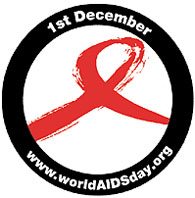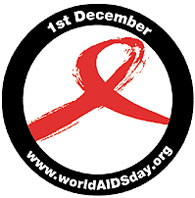The theme for this year's World AIDS Day, held as always on December 1, is "Stigma and Discrimination". The aim of this theme is to highlight and hopefully reduce the daily prejudices and hostilities that HIV-positive people can face. Previous themes have included last year's "I care. Do you?" which encouraged people to participate in caring for HIV-positive people, and "Sharing the Challenge" (1991) which encouraged people outside of high-risk groups to join the fight against AIDS.

Despite the numerous and tireless attempts to neutralise the virulent connotations of the disease, which have popped up everywhere from Madonna's fact sheet insert in her 1989 Like A Prayer album to the regular roll out of statistics that show how HIV infects without discrimination, outside of Africa AIDS was never, and still isn't, seen as "just a disease".
Though infection with HIV remains a dire and often deadly reality, the facts that it is often sexually transmitted and is disproportionately common among gay men in the West has entangled what is literally "just a disease" in a sticky web of religious moralising, scandal, sleaze and disgrace.
The official British World AIDS Day website puts it best: "People often harbour irrational fears towards people who have HIV. This is due to the association of HIV with the taboo subjects of blood, sex and death; irrational fears of plague and contagion based on myths and ignorance about how HIV is transmitted; and the impact of HIV on marginalised and unpopular social groups such as drug users, Africans and gay men."
When people are diagnosed with cancer, they are typically met with sympathy and support. When people are diagnosed with HIV/AIDS, they are more often than not met with some form of suspicion; and people keep their distance. AIDS is contagious. Parents still shy away from allowing their kids to play at kindergarten with others they know are HIV-positive, while even many African countries have approached their crushing experiences with AIDS tentatively, and from a distance.
Many HIV-positive people have to fight the disease on two simultaneous fronts: they have to face the actual disease itself, with its many grave and often desperate pressures, as well as battling the contempt and rejection of society and their peers. The latter are burdens that HIV positive people shouldn't have to bear, but, unfortunately, AIDS has no good points, and human nature hasn't always helped.
HIV-prejudice is not just the extreme, state-condoned prejudice that sees many HIV-positive people beaten up, ostracised, legislated against, or prevented access to entry visas and immigration, things that happen every day, in almost every country.

HIV-prejudice, like the disease itself, doesn't discriminate against any particular sexuality, and many HIV-negative gay men and lesbians would surely have to admit they'd have an issue of one kind or another embarking on a sexual relationship with a HIV-positive partner.
Are you HIV prejudiced?
It's a good question, and I know I'm tempted to say "of course not!" but I know that if I'm really honest, I might have to say that I am. When I learn someone is HIV-positive, my opinion of them doesn't change at all. But I would think twice about having sex with them, because they're HIV-positive.
I know that it's politically incorrect, and I'm sure I've had sex with many HIV-positive people without knowing it, but if I knew someone was HIV-positive, I would think twice about sex with that person. I'd probably go ahead and do it - I have gone ahead and done it - but I'd think twice. Is this a bad thing? Does that make me HIV-prejudiced, or just logical, careful?
Though we might support friends and loved ones, attend protest marches, or oppose official HIV-prejudice, don't we hold onto a rational fear of infection? As we all want to avoid infection or death from HIV/AIDS, aren't we all fundamentally HIV-prejudiced? If we maintain a false veneer that we aren't frightened by HIV/AIDS, and that we fully embrace our peers that are HIV-positive, doesn't that make the possibility of an open and honest approach to HIV/AIDS even more remote?
I guess it comes down to the assumption of HIV-negativity. I think many of us assume, maybe just because we want to, that our sex partners are HIV-negative. When we try to ignore anything, we do a double take when it pops up in our faces. Maybe we aren't as open about HIV/AIDS as we think we are. Maybe we need to talk about it, and get it out in the open, even more than we have done so far. Red ribbons are great, but not if they allow us to pass the buck and quickly say, "I care".
In any case, here are some sobering facts. Five million people around the world became infected with HIV in 2001. Also last year, three million people died of AIDS. That's almost the equivalent of the entire population of Singapore.
The World Health Organisation estimates that there are 40 million people in the world living with HIV/AIDS. Deaths from AIDS have created over 13 million orphans, and almost 22 million people have died from AIDS since the epidemic began.
Safe sex prevents the spread of AIDS, and, if you inject drugs, don't share needles. In most countries, counselling is available if you're HIV-positive, or care for someone who is.











 Printable Version
Printable Version










Reader's Comments
Be the first to leave a comment on this page!
Please log in to use this feature.